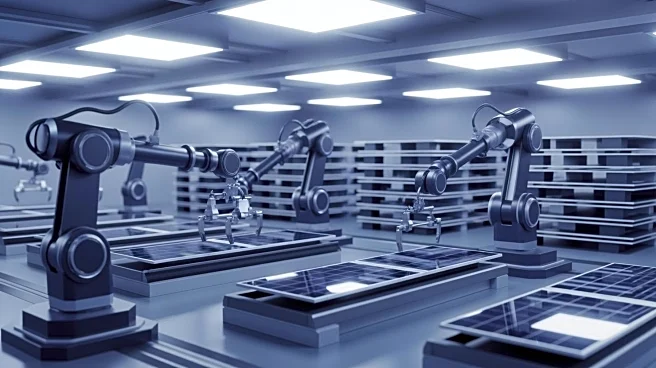What's Happening?
Beyond Gravity, a European parts manufacturer, has significantly expanded its production facility in Zurich, Switzerland, to meet the growing demand for satellite components. The company has increased
the area of its solar array drive mechanism production facility, boosting its annual production capacity from 36 to 200 units. This expansion is in response to the increasing demand for proliferated satellite constellations, which require efficient solar power solutions. Beyond Gravity's mechanisms are crucial for aligning satellites' solar arrays to optimize energy capture from the sun, thereby enhancing power efficiency and reducing launch costs. The company is also developing a next-generation two-axis drive mechanism to further improve energy yield for high-power missions.
Why It's Important?
The expansion by Beyond Gravity reflects a broader trend in the space industry towards serialized production and increased capacity to support the growing number of satellite constellations. This shift is driven by the need for European independence in space technology, as evidenced by projects like IRIS2. The move towards more frequent satellite launches and shorter lifespans necessitates efficient and cost-effective production methods. Beyond Gravity's investment in production capacity is part of a larger effort across the European space manufacturing sector to meet these demands, potentially leading to cost reductions and increased demand for satellite components.
What's Next?
Beyond Gravity may further expand its facility in Florida if demand continues to rise. The company is poised to support both large-scale missions and the growing commercial and civil satellite market. As the space race intensifies, the focus will likely shift towards more frequent launches and shorter satellite lifespans, requiring ongoing innovation in satellite technology and production methods. The company's advancements in solar array technology could play a significant role in future space missions, including NASA's Artemis lunar missions.
Beyond the Headlines
The shift towards serialized production and a robust commercial off-the-shelf (COTS) market in Europe could lead to a feedback loop of cost reductions and increased demand. This trend may influence global satellite manufacturing practices, encouraging other regions to adopt similar strategies to remain competitive. The emphasis on European independence in space technology highlights geopolitical considerations in the space industry, as countries seek to secure their own technological capabilities.









